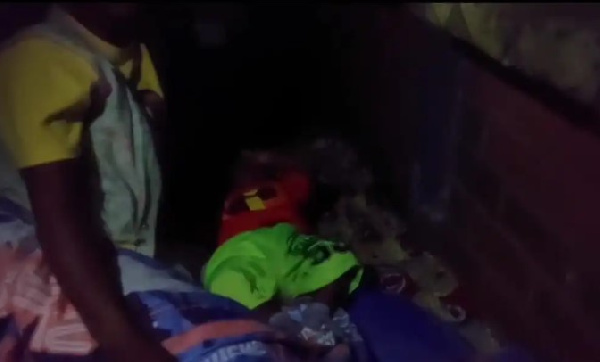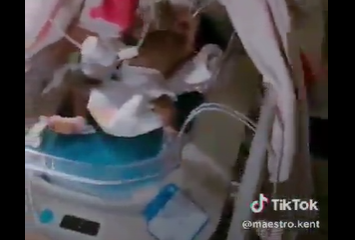GENERAL NEWS
Nightmares of homeless 5-month baby

That is the ordeal a homeless nursing mother, Felicia, 22, and her five-month-old baby have been enduring since the rainy season started.
The floor of an open shelve at the Tema Station in Accra has been the home of Felicia since she was discharged from the Korle-Bu Teaching Hospital, where she gave birth after a tortuous nine-month journey.
The Tema Station does not only serve as a bus terminal for workers around the Ministries enclave but is home to hundreds of traders, some of whom secure shelter on the pavements after the close of business.
Before bedtime, Felicia doubles the clothes of her baby on a cold night and guards her weak body against mosquitoes with a worn-out mosquito net tied onto pieces of stone.
“Because we sleep on the floor under the shelves, my son normally falls sick. I do not have money to go to the hospital, so I buy medicine from some drug peddlers around for him,” she told the Ghana News Agency.
The 22-year-old school dropout says she has not set her eyes on the father of her baby, who was a mate (bus conductor) at the Tema Station since she was three months pregnant.
“About a week after I told him I was pregnant, I didn’t see him again and all efforts to trace his whereabouts have not been successful,” she said.
Felicia’s dream of becoming a caterer was shattered when she dropped out of Senior High School in 2011, following the demise of her father.
Being the first of three children to a peasant farmer, the onus fell on her to travel from the northern part of the country to Accra in search of greener pastures.
“I worked as Kayayei (head potter) for about five years before switching to selling water and other items. The station has been my home throughout,” she said.
Felicia makes barely 20 Cedis a day by hawking biscuits at the bus terminal, an amount she says is not enough for her to effectively take care of her baby.
Through the support of her colleague hawkers and traders, she was able to mobilise some clothes to support the upkeep of her baby.
A chunk of her earnings goes into buying diapers for her baby, making it impossible for her to eat a balanced meal as a nursing mother.
“Aside from the breast milk I only feed him (baby) with porridge,” she said.
Felicia fears her baby could develop health complications as a result of the environmental conditions and appeals to the public to help her to rent a room.
She also appealed for support to establish a catering business to enable her to raise enough money to offer her baby befitting care.
“I know how to make cake and other pastries, but I do not have the capital to start my own business,” she said.
Paediatrician concerned
Reacting to the situation, Dr Gabrielle Obeng-Koranteng, a Paediatrician, and member of the Paediatric Society of Ghana, said Felicia’s baby could be exposed to a myriad of health complications, including malaria, pneumonia, tuberculosis, and diarrhoea.
She said the child could also suffer malnutrition as a result of the situation in which the mother finds herself.
She encouraged homeless mothers in such situations to endeavour to enrol their babies on the National Health Insurance Scheme and desist from self-medication practices which could have serious health implications for the child.
Dr Obeng-Koranteng called for the implementation of policies that would help rehabilitate displaced families in advanced situations and educate adolescents on sexual and emotional health to reduce delinquencies.
National issue
The United Nations International Children’s Education Fund (UNICEF) estimates that there are more than 100,000 street children across the country. These children do not have access to education, good health, decent clothing – and are sometimes abused by adults who should protect them.
A recent observation by Child Rights International (CRI) at bus stops within the central parts of the Greater Accra region revealed that on average there are 2 to 7 children at every traffic light either begging for alms, assisting the elderly or disabled to beg for alms or engaged in some form of trading or service during school hours.
The CRI in March 2022 dragged the Attorney General to the Supreme Court for “not taking urgent steps to ensure that children receive special protection against exposure to physical and moral hazards as enshrined in the 1992 Constitution of Ghana.”
Section 6 of the ‘The Children’s Act, 1998 Act 560’ guarantees the fundamental rights of every child – the right to life, dignity, respect, leisure, liberty, health, education and shelter from his parents.
Nonetheless, children of ‘street mothers,’ many of whom are often abandoned by their fathers, are denied these fundamental rights by virtue of the absence of workable social interventions targeting that vulnerable population.
It is the responsibility of parents to provide proper care for their children. But in the case of helpless children who may be victims of circumstances as it is in the case of Felicia’s baby, the State cannot look unconcerned whiles they grapple for survival in a harsh and unforgiving environment.
Source: GNA

















